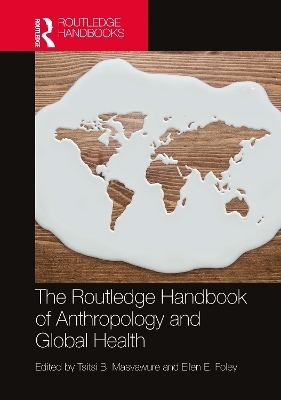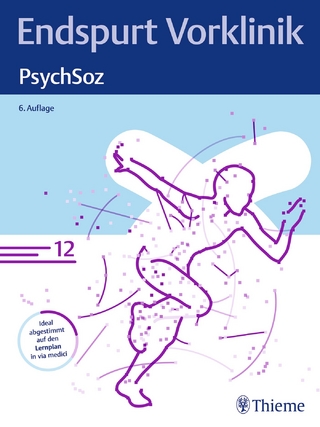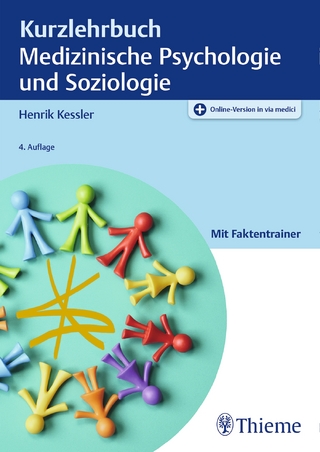
The Routledge Handbook of Anthropology and Global Health
Routledge (Verlag)
978-1-032-25637-5 (ISBN)
The Routledge Handbook of Anthropology and Global Health provides an overview of the complex relationship between anthropology and global health. The book brings together a diverse group of scholars who consider the intersection of anthropological concerns with health and disease as understood and intervened upon by the field of global health.
The book is structured around five sections: (1) social, cultural, and political determinants of health; (2) knowledge production in anthropology and global health; (3) persistent invisibilities in global health; (4) reimagining a critical global health; and (5) new horizons in anthropology and global health. Over these five themes a range of topics is explored, including:
rare diseases
medical pluralism
universal global health protocols
HIV
health security
indigenous communities
(non)communicable diseases
decolonizing global health
The Routledge Handbook of Anthropology and Global Health is an essential resource for upper-level students and researchers in anthropology, global health, sociology, international development, health studies, and politics.
Tsitsi B. Masvawure is an Assistant Professor (anthropology and global health) in the Department of Integrative and Global Studies, The Global School, Worcester Polytechnic Institute, Massachusetts. She has a PhD in Anthropology and is a feminist scholar, and global health researcher who studies gender, sexuality and health (primarily HIV) in southern Africa. Ellen E. Foley is a Professor in the Department of Sustainability and Social Justice at Clark University, Worcester, Massachusetts with a PhD in Anthropology. She studies sexual and reproductive health and rights, urban health disparities, and development interventions in francophone West Africa.
Introduction Part 1: Determinants of health: social, cultural, political 1. The “caste” of decolonization: structural casteism, public health praxis and radical accountability in contemporary India 2. Cultural determinants of health as a new strengths-based framework for global health: lessons from Indigenous Australia 3. Enhancing critical global mental health with anthropological ethnography: lessons from studies with ‘traumatised’ migrants 4. Accounting for accountability: performance-based financing and HIV prevention in China Part 2: Knowledge production in anthropology and global health 5. “This is not real anthropology”: an analysis of an anthropologist-led intervention at the World Health Organization 6. The measure of a mother: accounting for the risk of postpartum hemorrhage in global health 7. Dr. Mathur’s contradictory position: biosecurity, humanitarianism, and India’s Tuberculosis programme 8. What is a global health worldview? Teaching undergraduate global health using ethnography Part 3: Engaging local knowledge(s) 9. Non-western knowledge systems and utilization of traditional healing practices in contemporary Sri Lankan society 10. Missing trust and to miss trust: popular responses to COVID-19 in Burkina Faso 11. Indigenous midwifery revisited in COVID-19 times: the making of global maternal health and some anthropological lessons from Southern Mexico 12. Global health, intercultural health and the marginalisation of traditional birth attendants in Ecuador 13. Medical pluralism: opportunities and barriers to good health Part 4: Persistent invisibilities in global health infrastructures 14. Invisible straight men: heterosexual men’s ghostly lives and AIDS in Colombia 15. The neglected chronicity of Tuberculosis 16. Suitcases full of meds: deconstructing the political economy of pharmaceutical shortages in Lebanon with anthropological tools 17. First it was women and girls, now it is men: (in)visibility in global health programmes 18. Muslims Living with HIV in Durban, South Africa: addressing stigma, shame, and treatment Part 5: Toward a reimagined critical global health 19. Countering amnesia: the importance of history and anthropology in global health 20. Decolonizing global health: a critical perspective from Latin America 21. Localizing, decolonizing and the role of anthropology in a “new global health” 22. Global health as analytic and making sense of the domestic COVID responses in the U.S. 23. A seat at the table: what role for anthropology in global health? Part 6: New horizons in anthropology and global health 24. Anthropology, global health and rare diseases 25. Turkey, falls and the landscape of injury 26. Imagining global health through artificial intelligence 27. Epidemics in unstable places: anthropological perspectives on health security in West Africa 28. What if Europe’s aspiration for a leading role in Global Health starts at its borders?; Conclusion
| Erscheinungsdatum | 22.03.2024 |
|---|---|
| Reihe/Serie | Routledge Anthropology Handbooks |
| Zusatzinfo | 1 Line drawings, black and white; 1 Illustrations, black and white |
| Verlagsort | London |
| Sprache | englisch |
| Maße | 174 x 246 mm |
| Gewicht | 453 g |
| Themenwelt | Studium ► 1. Studienabschnitt (Vorklinik) ► Med. Psychologie / Soziologie |
| Naturwissenschaften ► Biologie ► Humanbiologie | |
| Sozialwissenschaften ► Ethnologie | |
| Sozialwissenschaften ► Soziologie | |
| ISBN-10 | 1-032-25637-0 / 1032256370 |
| ISBN-13 | 978-1-032-25637-5 / 9781032256375 |
| Zustand | Neuware |
| Informationen gemäß Produktsicherheitsverordnung (GPSR) | |
| Haben Sie eine Frage zum Produkt? |
aus dem Bereich


